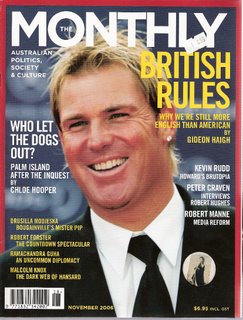 Review: The Monthly, November 2006
Review: The Monthly, November 2006'Who Let the Dogs Out?' is an examination of the Palm Island death in custody of an Aboriginal man and the subsequent suicide of his son. In this blistering expose of the crimes committed against Palm Islanders, the author, Chloe Hooper, employs numerous novelistic techniques in an effort to bring to life a series of incredible events. Descriptions of scenes and individuals are deployed effectively along with straight reporting to produce maximum exposure of the crimes. Dialogue is also reproduced. The effect is brilliant.
This issue of The Monthly also includes an amusing overview by Malcolm Knox of the public Hansard: the record of parliamentary proceedings. It is wry and funny, with several barbs being flung at irresponsible targets who made themselves too big to miss.
'British Rules: Why we're still more English than American' looks at our sporting heritage with aplomb and good humour. It is also full of interesting quotes from publications down the years (I won't say 'down the ages' as that would sound odd).
Peter Craven, a literary critic with Fairfax, talks with expat and art critic Robert Hughes in 'Time's Arrow'. It makes me wonder: if Robert Hughes can do a history book (The Fatal Shore) it stands to reason that Simon Schama would do a book about art (the recently-published and soon-to-be-released-here Power of Art). Hughes sounds authentically Australian and a very interesting person to get to talk to over the telephone: he happened to be in Barcelona to receive a prize from the government when Craven hooked up with him.
Drusilla Modjeska's review of Lloyd Jones' Mister Pip is very nicely written and worth reading. There's also a quaint little piece by an Indian named Ramachandra Guha on an out-of-print biography on Jawaharlal Nehru written by an Australian diplomat: Nehru: A Contemporary Estimate. "In his assessment of the Indian prime minister, Croker was probably helped by his citizenship of a small nation with no stake in the Cold War." Well, I'm not sure how exactly true that is, but it's nice to know that he thinks Walter Croker did a good job.
Then there's Kevin Rudd, banging the old, tinny drum again:
This deep split within the Right provides new opportunities for Labor to argue for a comprehensive set of values that intelligently harness both the importance of the market and the importance of the family, community and society which markets ultimately serve.
I apologise for not ensuring that this extract makes sense. I shrink from the labour of doing so, when the arguments are so hollow and feverish. Who exactly is going to establish these values, in the Labor party? Beazley? I don't think so. And by what social calculus does Rudd presume to insist that "markets ultimately serve" "family, community and society"? I'm not sure I know what that means, and I suspect that Rudd doesn't, either. He's bluffing, as usual with weak politicians on the make. In fact, why does he think that these same markets do NOT serve society, especially. Let alone family (I telephone my parents regularly and send money to my family) and community (I walk up to the shops a couple of times a week and say g'day to the tobacconist, the newsagent and, occasionally, pass a kind word to the person at the supermarket check-out). Anyway, I stopped reading it when I came to this nonsensical sentence.
No comments:
Post a Comment